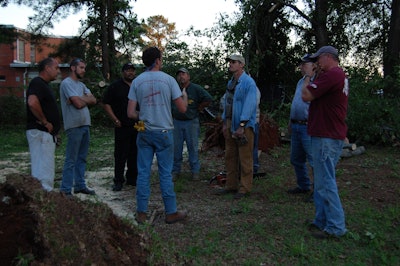 When tornados struck Tuscaloosa on April 27, 2011, a spontaneous army of tens of thousands of volunteers fanned out to help their neighbors.
When tornados struck Tuscaloosa on April 27, 2011, a spontaneous army of tens of thousands of volunteers fanned out to help their neighbors.It was a few days short of six months ago that I wrote about Hurricane Sandy and how volunteers should respond in the wake of catastrophic natural disasters. Those of you who are heading to Oklahoma soon might do well to read it here first.
Nineteen months before that I blogged on our old website about how our hometown, Tuscaloosa, Alabama responded to the tornadoes that killed 51 in this city, 238 in the state, and destroyed thousands of homes on April 27, 2011.
So after the terrible events of Monday in Moore, Oklahoma, I don’t have any new advice to offer except this: There is power in simply doing something. It doesn’t matter what, or how much. Just do something. Disaster fatigue is not an acceptable response.
Paralysis sets in when we think somebody else has the problem covered, or we think the tragedy is so big and our efforts are so small that they don’t amount to anything.
If that’s what you’re thinking, you’re wrong on both counts.
The biggest tragedy of Hurricane Katrina in 2005 was that so many people thought the government was going to come rescue them. Volunteers with boats were turned away, many forced back by government officials.
The biggest triumph that emerged from Tuscaloosa in the days after the April 27 tornado was that nobody turned anybody away, nobody asked permission, nobody waited for the government to tell them what to do. As I wrote in the second link above, by the time the sun rose the morning after the tornado, tens of thousands of regular folks had formed up into spontaneous, self-organizing squadrons and fanned out across the city. If they weren’t clearing debris or chainsawing trees, or stockpiling clothes and blankets at local churches they were bringing water and food to the people who were. And it wasn’t just the locals. I saw license plates from six different states pouring into our torn up little town.
In the chaos that followed the Tuscaloosa tornado this volunteer army kept at it for weeks. In time the Federal Emergency Management Agency, the National Guard, the state and local governments and big contractors put enough boots on the ground that the need for volunteers diminished. This will happen too in Oklahoma. But it takes time for the official response to ramp up.
For now, Moore, Oklahoma, needs your help, as do the volunteers who are already there. It doesn’t matter what you can do. Even if you don’t have construction or medical skills, you can hand out bottles of cold water. You can bring food. If you can’t be there you can donate money or supplies to the Red Cross or Samaritan’s Purse or any of the hundreds of organizations in the vanguard of this effort. Say you don’t like the Red Cross or the Baptists? Get over it. That’s how losers think.
There’s a Facebook page now, serving as a clearinghouse for information Moore, Oklahoma volunteers and victims. And if you’ve lived through one of these disasters, you know the Humane Society does a great job of finding lost pets and animals and getting them back to their owners or new homes.
With all the scandals brewing at the Internal Revenue Service and our elected leaders hacking away at each other, there’s a feeling of resignation about. The government is off the rails. Nobody can do anything about any of it and nobody will. Nothing in Washington D.C. will change.
But you can change things in Moore, Oklahoma. Look around. Figure out what you can do, and do it. Get off the bench, step up to the plate. The coach wants you in the game.








